Comprehensive Analysis of Human Reproduction and Development
VerifiedAdded on 2023/01/18
|7
|1210
|66
Homework Assignment
AI Summary
This assignment delves into the intricacies of human reproduction, exploring the roles of genetic, hormonal, and environmental factors in embryonic and foetal development. The document begins with flowcharts illustrating the menstrual cycle and the stages of human development from fertilisation to birth. It then examines the impact of genetic factors, highlighting how parental genes influence the fertilisation process and foetal development, with a focus on the potential for genetic mutations. The assignment also analyses the influence of sex hormones, such as oestrogen and progesterone, on fertility and foetal development, as well as the role of placental hormones in providing nutrition. Finally, it discusses the environmental factors that affect foetal development, including temperature, air quality, and social structures, along with the impact of maternal habits such as smoking and alcohol consumption. The assignment concludes with a comprehensive overview of the factors influencing the development of human life, supported by cited research.
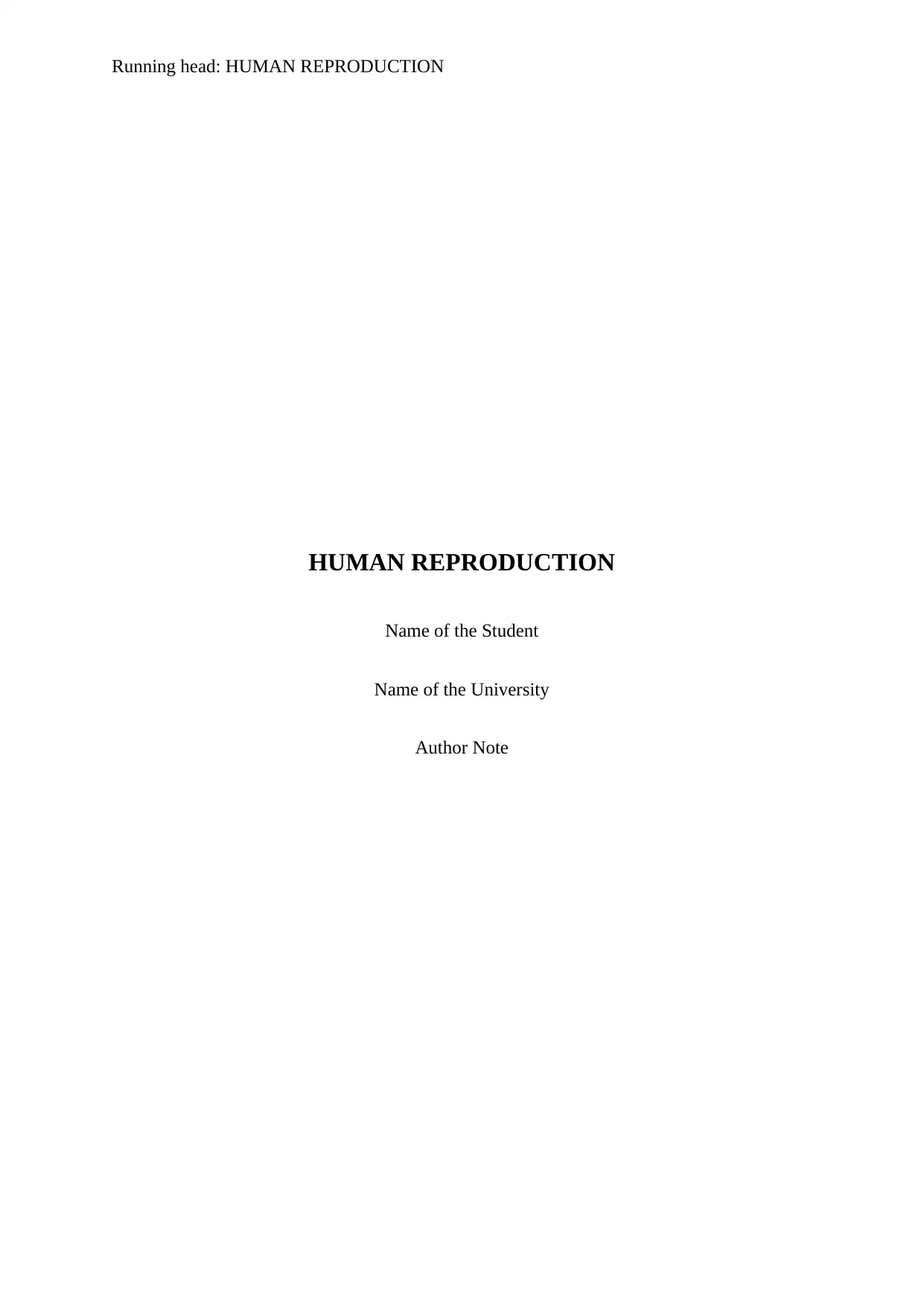
Running head: HUMAN REPRODUCTION
HUMAN REPRODUCTION
Name of the Student
Name of the University
Author Note
HUMAN REPRODUCTION
Name of the Student
Name of the University
Author Note
Paraphrase This Document
Need a fresh take? Get an instant paraphrase of this document with our AI Paraphraser
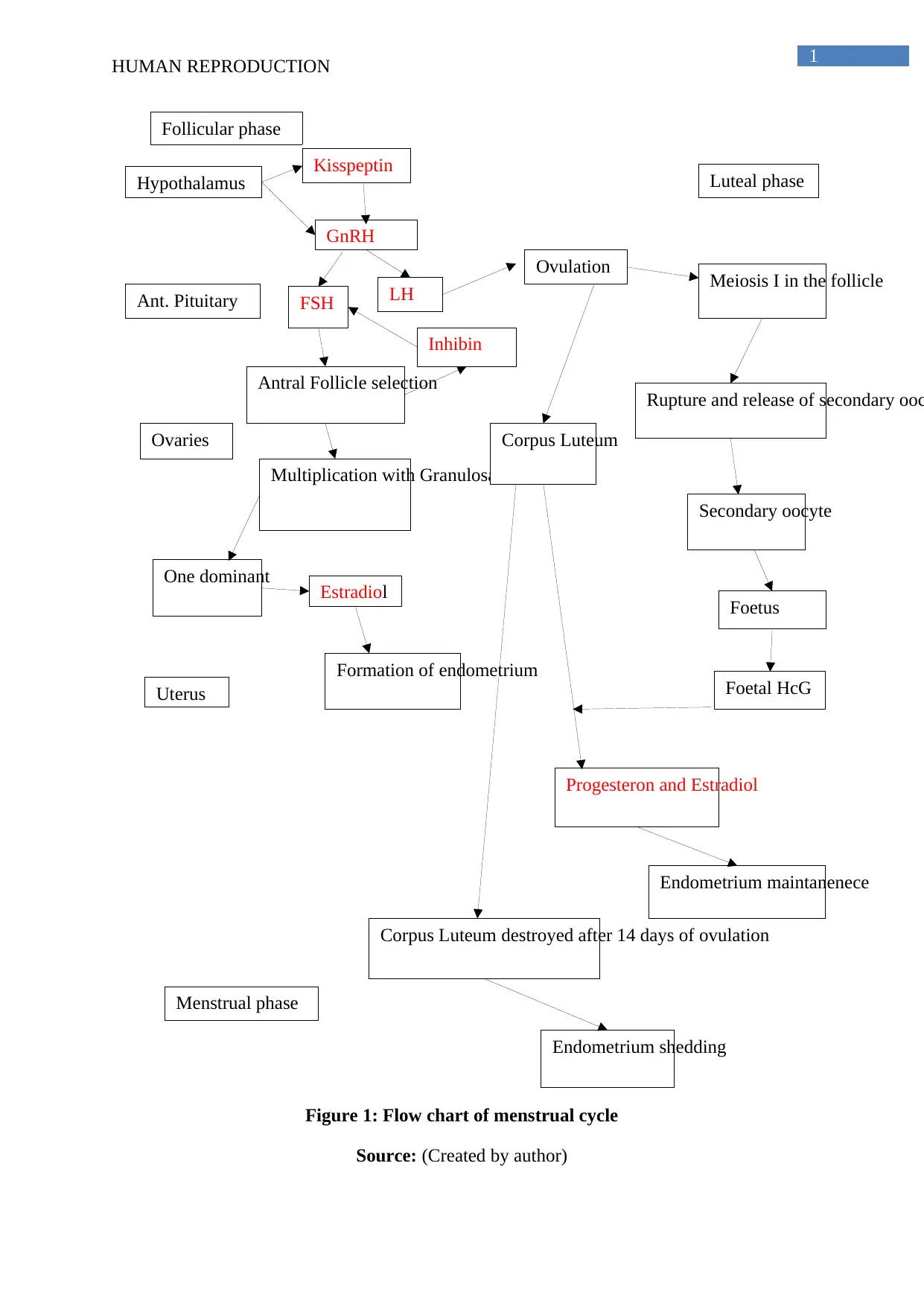
1
Estradiol
Ant. Pituitary
Ovaries
FSH
Uterus
Hypothalamus
LH
Antral Follicle selection
Multiplication with Granulosa cell
One dominant
Ovulation
GnRH
Formation of endometrium
Kisspeptin
Inhibin
Meiosis I in the follicle
Secondary oocyte
Foetal HcG
Foetus
Corpus Luteum
Progesteron and Estradiol
Rupture and release of secondary ooc
Corpus Luteum destroyed after 14 days of ovulation
Endometrium maintanenece
Endometrium shedding
Luteal phase
Menstrual phase
HUMAN REPRODUCTION
Figure 1: Flow chart of menstrual cycle
Source: (Created by author)
Follicular phase
Estradiol
Ant. Pituitary
Ovaries
FSH
Uterus
Hypothalamus
LH
Antral Follicle selection
Multiplication with Granulosa cell
One dominant
Ovulation
GnRH
Formation of endometrium
Kisspeptin
Inhibin
Meiosis I in the follicle
Secondary oocyte
Foetal HcG
Foetus
Corpus Luteum
Progesteron and Estradiol
Rupture and release of secondary ooc
Corpus Luteum destroyed after 14 days of ovulation
Endometrium maintanenece
Endometrium shedding
Luteal phase
Menstrual phase
HUMAN REPRODUCTION
Figure 1: Flow chart of menstrual cycle
Source: (Created by author)
Follicular phase
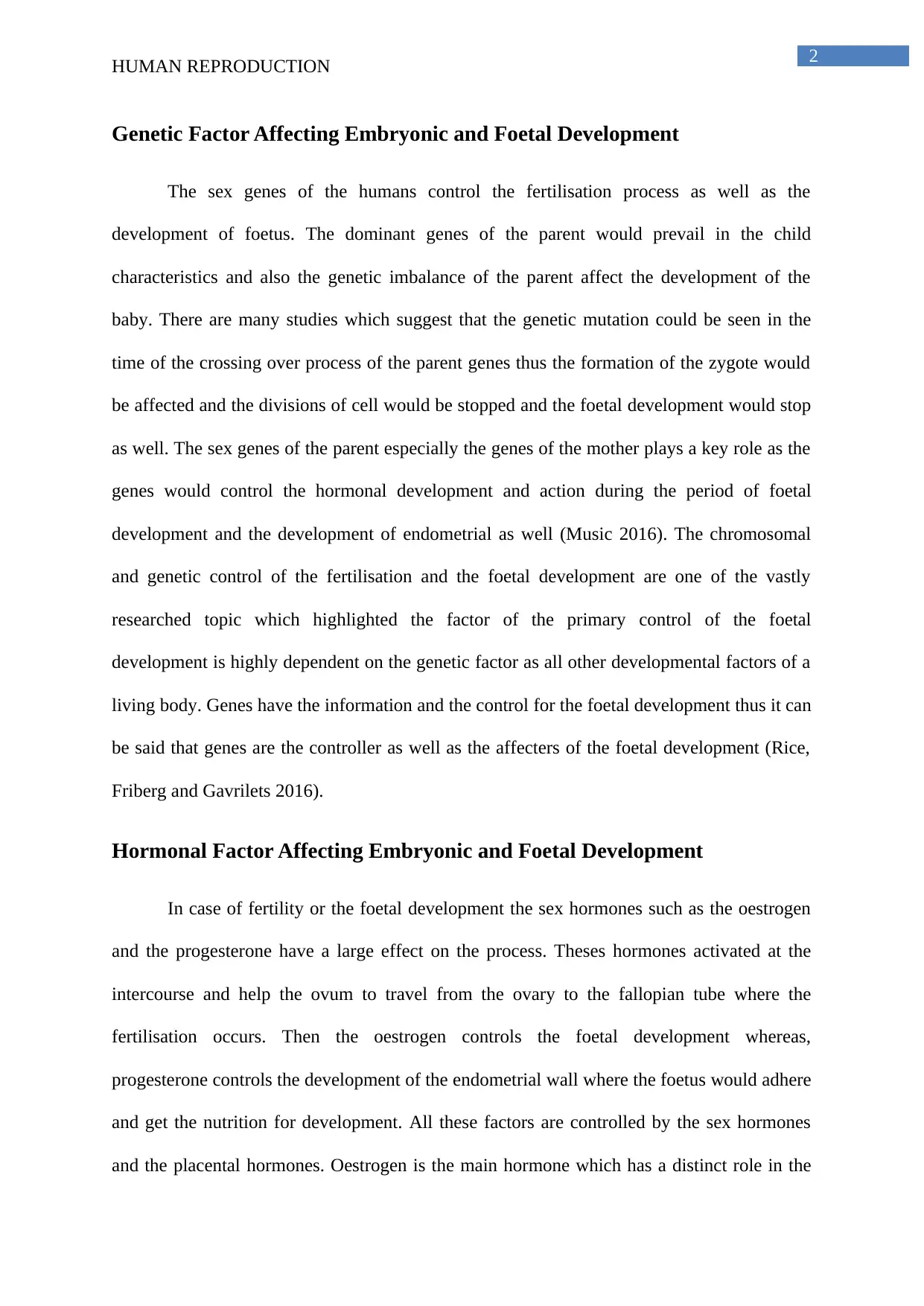
2
HUMAN REPRODUCTION
Genetic Factor Affecting Embryonic and Foetal Development
The sex genes of the humans control the fertilisation process as well as the
development of foetus. The dominant genes of the parent would prevail in the child
characteristics and also the genetic imbalance of the parent affect the development of the
baby. There are many studies which suggest that the genetic mutation could be seen in the
time of the crossing over process of the parent genes thus the formation of the zygote would
be affected and the divisions of cell would be stopped and the foetal development would stop
as well. The sex genes of the parent especially the genes of the mother plays a key role as the
genes would control the hormonal development and action during the period of foetal
development and the development of endometrial as well (Music 2016). The chromosomal
and genetic control of the fertilisation and the foetal development are one of the vastly
researched topic which highlighted the factor of the primary control of the foetal
development is highly dependent on the genetic factor as all other developmental factors of a
living body. Genes have the information and the control for the foetal development thus it can
be said that genes are the controller as well as the affecters of the foetal development (Rice,
Friberg and Gavrilets 2016).
Hormonal Factor Affecting Embryonic and Foetal Development
In case of fertility or the foetal development the sex hormones such as the oestrogen
and the progesterone have a large effect on the process. Theses hormones activated at the
intercourse and help the ovum to travel from the ovary to the fallopian tube where the
fertilisation occurs. Then the oestrogen controls the foetal development whereas,
progesterone controls the development of the endometrial wall where the foetus would adhere
and get the nutrition for development. All these factors are controlled by the sex hormones
and the placental hormones. Oestrogen is the main hormone which has a distinct role in the
HUMAN REPRODUCTION
Genetic Factor Affecting Embryonic and Foetal Development
The sex genes of the humans control the fertilisation process as well as the
development of foetus. The dominant genes of the parent would prevail in the child
characteristics and also the genetic imbalance of the parent affect the development of the
baby. There are many studies which suggest that the genetic mutation could be seen in the
time of the crossing over process of the parent genes thus the formation of the zygote would
be affected and the divisions of cell would be stopped and the foetal development would stop
as well. The sex genes of the parent especially the genes of the mother plays a key role as the
genes would control the hormonal development and action during the period of foetal
development and the development of endometrial as well (Music 2016). The chromosomal
and genetic control of the fertilisation and the foetal development are one of the vastly
researched topic which highlighted the factor of the primary control of the foetal
development is highly dependent on the genetic factor as all other developmental factors of a
living body. Genes have the information and the control for the foetal development thus it can
be said that genes are the controller as well as the affecters of the foetal development (Rice,
Friberg and Gavrilets 2016).
Hormonal Factor Affecting Embryonic and Foetal Development
In case of fertility or the foetal development the sex hormones such as the oestrogen
and the progesterone have a large effect on the process. Theses hormones activated at the
intercourse and help the ovum to travel from the ovary to the fallopian tube where the
fertilisation occurs. Then the oestrogen controls the foetal development whereas,
progesterone controls the development of the endometrial wall where the foetus would adhere
and get the nutrition for development. All these factors are controlled by the sex hormones
and the placental hormones. Oestrogen is the main hormone which has a distinct role in the
⊘ This is a preview!⊘
Do you want full access?
Subscribe today to unlock all pages.

Trusted by 1+ million students worldwide
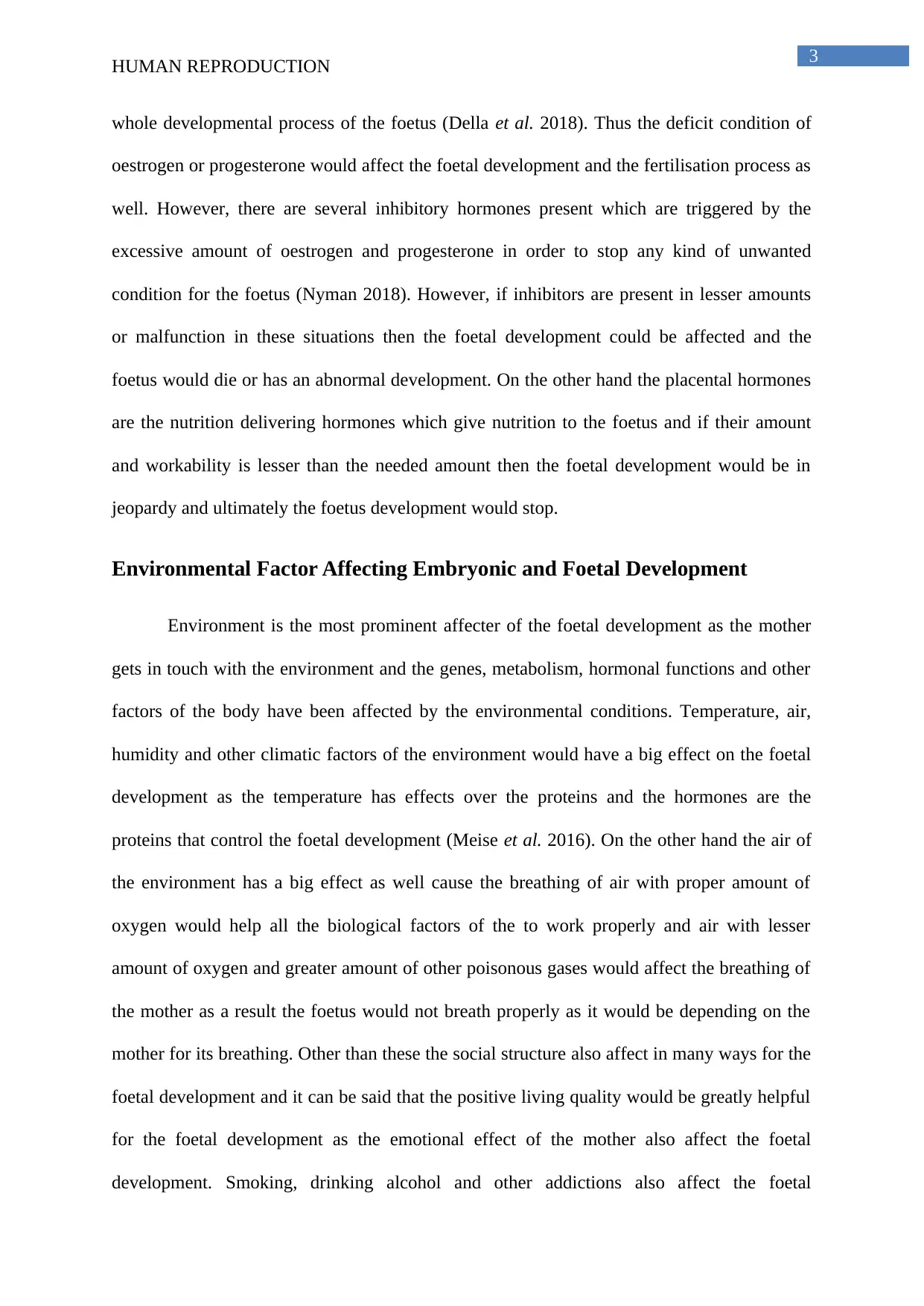
3
HUMAN REPRODUCTION
whole developmental process of the foetus (Della et al. 2018). Thus the deficit condition of
oestrogen or progesterone would affect the foetal development and the fertilisation process as
well. However, there are several inhibitory hormones present which are triggered by the
excessive amount of oestrogen and progesterone in order to stop any kind of unwanted
condition for the foetus (Nyman 2018). However, if inhibitors are present in lesser amounts
or malfunction in these situations then the foetal development could be affected and the
foetus would die or has an abnormal development. On the other hand the placental hormones
are the nutrition delivering hormones which give nutrition to the foetus and if their amount
and workability is lesser than the needed amount then the foetal development would be in
jeopardy and ultimately the foetus development would stop.
Environmental Factor Affecting Embryonic and Foetal Development
Environment is the most prominent affecter of the foetal development as the mother
gets in touch with the environment and the genes, metabolism, hormonal functions and other
factors of the body have been affected by the environmental conditions. Temperature, air,
humidity and other climatic factors of the environment would have a big effect on the foetal
development as the temperature has effects over the proteins and the hormones are the
proteins that control the foetal development (Meise et al. 2016). On the other hand the air of
the environment has a big effect as well cause the breathing of air with proper amount of
oxygen would help all the biological factors of the to work properly and air with lesser
amount of oxygen and greater amount of other poisonous gases would affect the breathing of
the mother as a result the foetus would not breath properly as it would be depending on the
mother for its breathing. Other than these the social structure also affect in many ways for the
foetal development and it can be said that the positive living quality would be greatly helpful
for the foetal development as the emotional effect of the mother also affect the foetal
development. Smoking, drinking alcohol and other addictions also affect the foetal
HUMAN REPRODUCTION
whole developmental process of the foetus (Della et al. 2018). Thus the deficit condition of
oestrogen or progesterone would affect the foetal development and the fertilisation process as
well. However, there are several inhibitory hormones present which are triggered by the
excessive amount of oestrogen and progesterone in order to stop any kind of unwanted
condition for the foetus (Nyman 2018). However, if inhibitors are present in lesser amounts
or malfunction in these situations then the foetal development could be affected and the
foetus would die or has an abnormal development. On the other hand the placental hormones
are the nutrition delivering hormones which give nutrition to the foetus and if their amount
and workability is lesser than the needed amount then the foetal development would be in
jeopardy and ultimately the foetus development would stop.
Environmental Factor Affecting Embryonic and Foetal Development
Environment is the most prominent affecter of the foetal development as the mother
gets in touch with the environment and the genes, metabolism, hormonal functions and other
factors of the body have been affected by the environmental conditions. Temperature, air,
humidity and other climatic factors of the environment would have a big effect on the foetal
development as the temperature has effects over the proteins and the hormones are the
proteins that control the foetal development (Meise et al. 2016). On the other hand the air of
the environment has a big effect as well cause the breathing of air with proper amount of
oxygen would help all the biological factors of the to work properly and air with lesser
amount of oxygen and greater amount of other poisonous gases would affect the breathing of
the mother as a result the foetus would not breath properly as it would be depending on the
mother for its breathing. Other than these the social structure also affect in many ways for the
foetal development and it can be said that the positive living quality would be greatly helpful
for the foetal development as the emotional effect of the mother also affect the foetal
development. Smoking, drinking alcohol and other addictions also affect the foetal
Paraphrase This Document
Need a fresh take? Get an instant paraphrase of this document with our AI Paraphraser
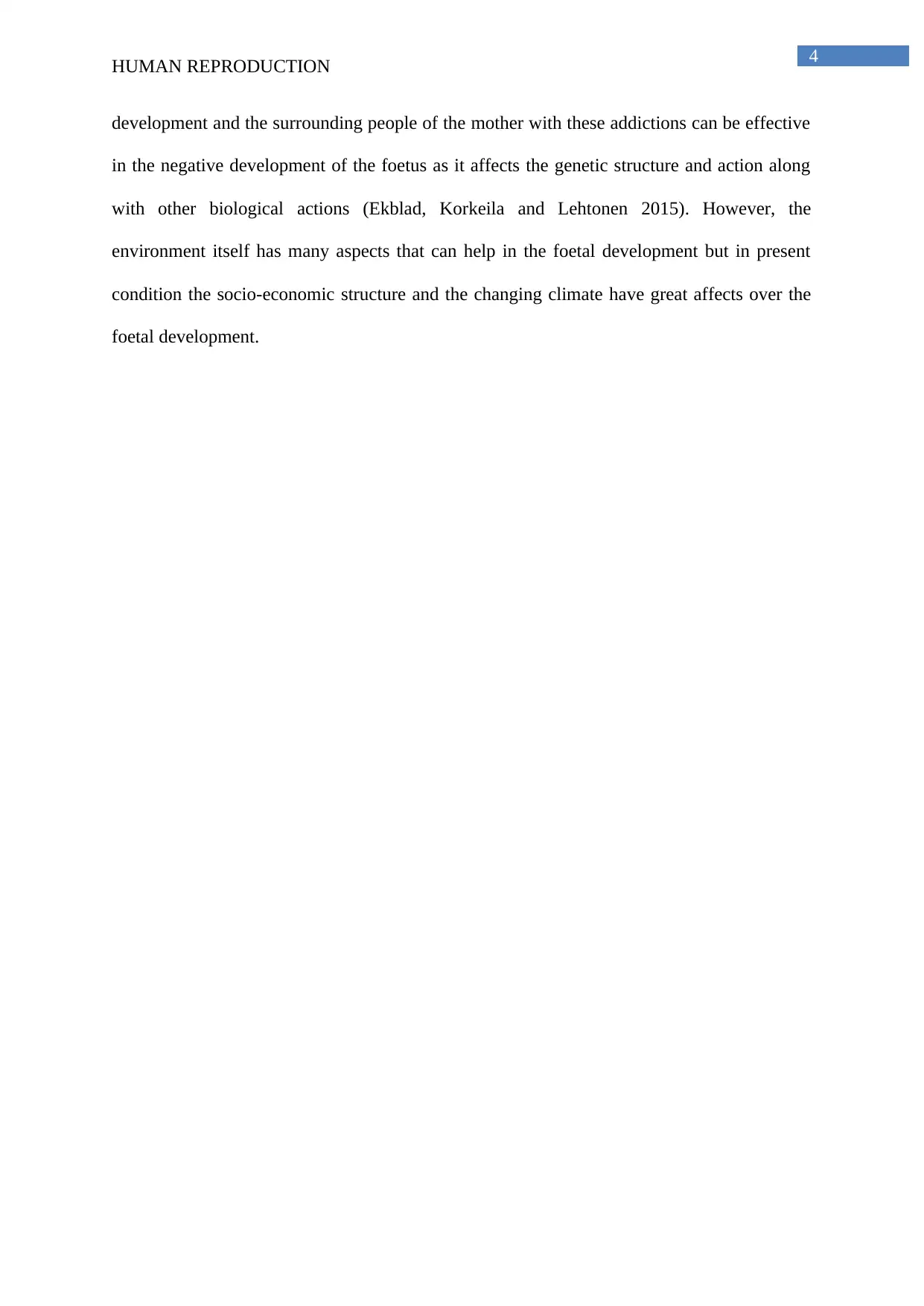
4
HUMAN REPRODUCTION
development and the surrounding people of the mother with these addictions can be effective
in the negative development of the foetus as it affects the genetic structure and action along
with other biological actions (Ekblad, Korkeila and Lehtonen 2015). However, the
environment itself has many aspects that can help in the foetal development but in present
condition the socio-economic structure and the changing climate have great affects over the
foetal development.
HUMAN REPRODUCTION
development and the surrounding people of the mother with these addictions can be effective
in the negative development of the foetus as it affects the genetic structure and action along
with other biological actions (Ekblad, Korkeila and Lehtonen 2015). However, the
environment itself has many aspects that can help in the foetal development but in present
condition the socio-economic structure and the changing climate have great affects over the
foetal development.
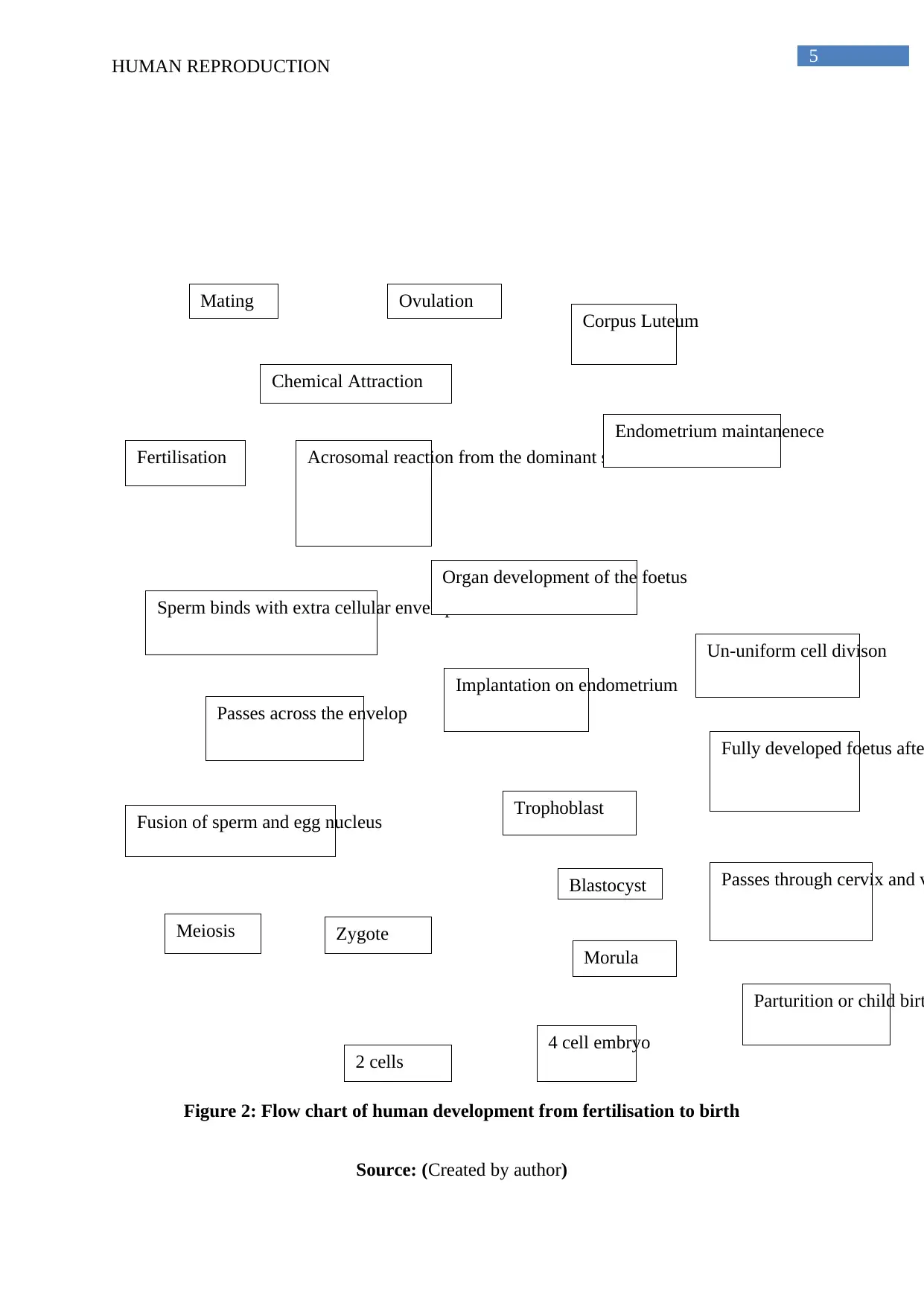
5
Mating
Chemical Attraction
Ovulation
Acrosomal reaction from the dominant sperm
Sperm binds with extra cellular envelop
Passes across the envelop
Fusion of sperm and egg nucleus
Fertilisation
Corpus Luteum
Endometrium maintanenece
Trophoblast
Implantation on endometrium
Zygote
Morula
Un-uniform cell divison
4 cell embryo
Blastocyst
Organ development of the foetus
2 cells
Meiosis
Fully developed foetus afte
Parturition or child birt
Passes through cervix and v
HUMAN REPRODUCTION
Figure 2: Flow chart of human development from fertilisation to birth
Source: (Created by author)
Mating
Chemical Attraction
Ovulation
Acrosomal reaction from the dominant sperm
Sperm binds with extra cellular envelop
Passes across the envelop
Fusion of sperm and egg nucleus
Fertilisation
Corpus Luteum
Endometrium maintanenece
Trophoblast
Implantation on endometrium
Zygote
Morula
Un-uniform cell divison
4 cell embryo
Blastocyst
Organ development of the foetus
2 cells
Meiosis
Fully developed foetus afte
Parturition or child birt
Passes through cervix and v
HUMAN REPRODUCTION
Figure 2: Flow chart of human development from fertilisation to birth
Source: (Created by author)
⊘ This is a preview!⊘
Do you want full access?
Subscribe today to unlock all pages.

Trusted by 1+ million students worldwide
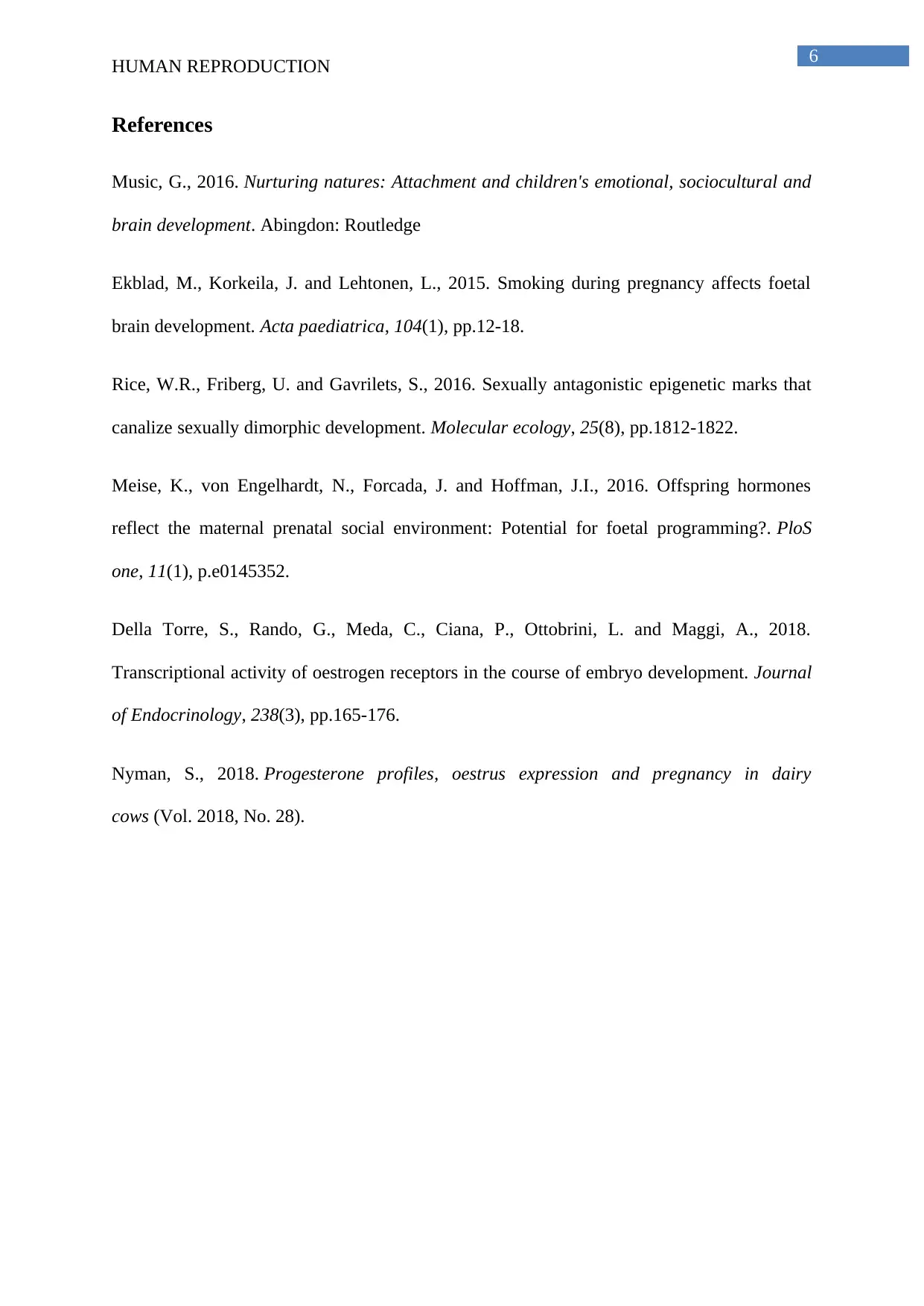
6
HUMAN REPRODUCTION
References
Music, G., 2016. Nurturing natures: Attachment and children's emotional, sociocultural and
brain development. Abingdon: Routledge
Ekblad, M., Korkeila, J. and Lehtonen, L., 2015. Smoking during pregnancy affects foetal
brain development. Acta paediatrica, 104(1), pp.12-18.
Rice, W.R., Friberg, U. and Gavrilets, S., 2016. Sexually antagonistic epigenetic marks that
canalize sexually dimorphic development. Molecular ecology, 25(8), pp.1812-1822.
Meise, K., von Engelhardt, N., Forcada, J. and Hoffman, J.I., 2016. Offspring hormones
reflect the maternal prenatal social environment: Potential for foetal programming?. PloS
one, 11(1), p.e0145352.
Della Torre, S., Rando, G., Meda, C., Ciana, P., Ottobrini, L. and Maggi, A., 2018.
Transcriptional activity of oestrogen receptors in the course of embryo development. Journal
of Endocrinology, 238(3), pp.165-176.
Nyman, S., 2018. Progesterone profiles, oestrus expression and pregnancy in dairy
cows (Vol. 2018, No. 28).
HUMAN REPRODUCTION
References
Music, G., 2016. Nurturing natures: Attachment and children's emotional, sociocultural and
brain development. Abingdon: Routledge
Ekblad, M., Korkeila, J. and Lehtonen, L., 2015. Smoking during pregnancy affects foetal
brain development. Acta paediatrica, 104(1), pp.12-18.
Rice, W.R., Friberg, U. and Gavrilets, S., 2016. Sexually antagonistic epigenetic marks that
canalize sexually dimorphic development. Molecular ecology, 25(8), pp.1812-1822.
Meise, K., von Engelhardt, N., Forcada, J. and Hoffman, J.I., 2016. Offspring hormones
reflect the maternal prenatal social environment: Potential for foetal programming?. PloS
one, 11(1), p.e0145352.
Della Torre, S., Rando, G., Meda, C., Ciana, P., Ottobrini, L. and Maggi, A., 2018.
Transcriptional activity of oestrogen receptors in the course of embryo development. Journal
of Endocrinology, 238(3), pp.165-176.
Nyman, S., 2018. Progesterone profiles, oestrus expression and pregnancy in dairy
cows (Vol. 2018, No. 28).
1 out of 7
Related Documents
Your All-in-One AI-Powered Toolkit for Academic Success.
+13062052269
info@desklib.com
Available 24*7 on WhatsApp / Email
![[object Object]](/_next/static/media/star-bottom.7253800d.svg)
Unlock your academic potential
Copyright © 2020–2026 A2Z Services. All Rights Reserved. Developed and managed by ZUCOL.



